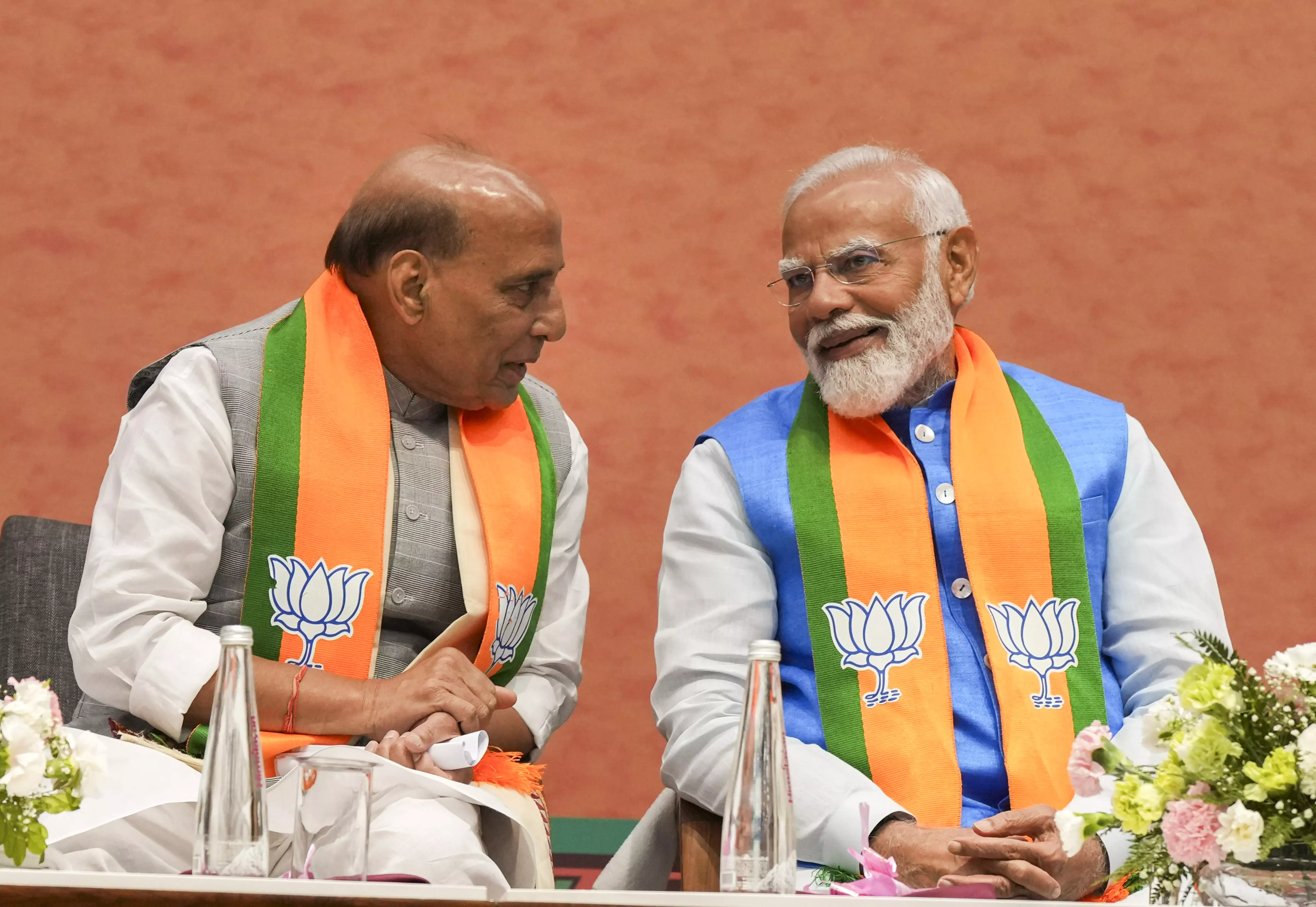
BJP manifesto: ‘Poor, youth, women our priority,’ says Modi; promises UCC implementation
Besides a focus on the poor, women and youth, BJP promises to bring a Uniform Civil Code, implement CAA, make One Nation, One Election a reality

Even as recent surveys have highlighted that unemployment and price rise are the biggest issues facing the people today, the Bharatiya Janata Party (BJP)'s manifesto or Sankalp Patra (Vision document) released on April 14 has targetted women, the poor, youth and farmers in the country. The saffron party has released its manifesto with 'Modi ki guarantees' with a firm eye on achieving its target of garnering a 50 per cent vote share in the upcoming 2024 Lok Sabha elections.
Some of the key promises by the BJP include: bringing a Uniform Civil Code (UCC); facilitating the Indian Olympic Association to bid for hosting the Olympic Games in 2036; implementing the Citizenship Amendment Act (CAA); making One Nation, One Election a reality; and implementing law against paper leaks.
Releasing its election manifesto, or Sankalp Patra (vision document) on Sunday, Prime Minister Narendra Modi promised that the Union government, in its third term, will build at least 3 crore more houses for the financially weaker section. The Union government has already constructed over 4 crore houses for the poor in the last 10 years of the BJP government.
Harping on the empowerment of the financially weaker sections, the PM said that the Union government was able to bring at least 25 crore people out of poverty in the last 10 years and the results were achieved because of the result-oriented approach of the Union government.
“Looking at the Sankalp Patra of the BJP, it is fair to say that we are moving forward to achieve our target of 50 per cent voter share in the elections. The PM has also given a clear road map that the focus of the Union government in the third term will be women, youth, the poor and farmers. Development along with culture and heritage is the focus of the Union government,” Mukhtar Abbas Naqvi, former Union minister, told The Federal.
Focus on the poor, youth, and women
“Our Sankalp Patra empowers the four strong pillars of Viksit Bharat – youth, power, women power, the poor and farmers. Our focus is on dignity of life, quality of life and employment through investments. In the last ten years, the BJP has fulfilled each and every promise it made. It is my guarantee that free ration will be provided to the poor for the next five years. It is Modi’s guarantee that the food plate of the poor is healthy and affordable,” said PM Modi on Sunday while releasing BJP's election manifesto.
Talking about the empowerment of women, the PM further elaborated that more than 10 crore women who are associated with different self-help groups will now be trained in information technology, education, health care, retail and tourism.
With a clear focus on the empowerment of Scheduled Castes, Scheduled Tribes and other backward classes (OBCs), the PM also emphasised that the Union government will provide easy loans under the MUDRA scheme and the new loan limit has been doubled to ₹20 lakh.
Further talking about providing health care benefits to the people, PM Modi said that the Union government will provide health insurance of ₹5 lakh to all senior citizens above the age group of 70 years in the next term of BJP and the scheme will not be limited to the financially weaker sections.
To consolidate its social engineering formula before the elections, the BJP has also mentioned in the manifesto that more than 60 per cent of current ministers belong to the OBC, SC and ST communities.
“In the last decade, over 63 lakh street vendors have received easy credit under PM Svanidhi scheme and 2.2 Lakh beneficiaries from SC, ST communities and women received easy credit of more than ₹50,000 crore under Stand Up India. We are going to further expand these schemes for the benefit of the poor,” PM said.
However, political analysts believe that there is no single overarching narrative in this national election and the BJP has no option but to depend on the popularity of PM Modi to win the election. Abhay Kumar Dubey, author and professor at Centre for the Study of Developing Societies (CSDS), told The Federal, "The biggest challenge for the Union government is that there is no overarching single narrative for the entire country. Recent studies by Lokniti CSDS also suggest that unemployment and price rise are the biggest issues for people. So, the BJP has no option but to focus on the popularity of PM Modi to win this elections."
Implementation of the UCC
The manifesto however promises to bring in the UCC if the BJP is voted to power. After completing the promise of construction of a Ram temple in Ayodhya and abrogation of Article 370 from Jammu and Kashmir in the second term of the BJP government when it secured a bigger mandate, PM Modi again asked the people for a full majority government to fulfill the promise of implementing the Uniform Civil Code (UCC) in the country.
Elaborating on the tasks ahead for the Union government, PM Modi also said that his government will implement the One Nation, One Election in the next five years. “People are aware that BJP takes hard decisions for the benefit of the country and also for the long-term good of the country,” the PM added.
Political analysts pointed out that the BJP is currently finding it difficult to implement the UCC due to opposition from the other members of the National Democratic Alliance (NDA), especially in the north-east, Chhattisgarh, and Jharkhand. Members of the Vanvasi Kalyan Ashram (VKA), an affiliate of the Rashtriya Swayamsevak Sangh (RSS) has also asked the Union government to proceed cautiously in dealing with the issue and for greater dialogue with different stakeholders before implementing the UCC.

